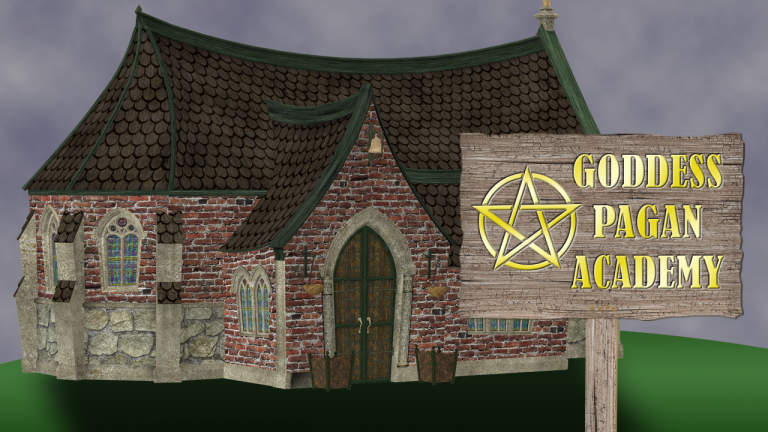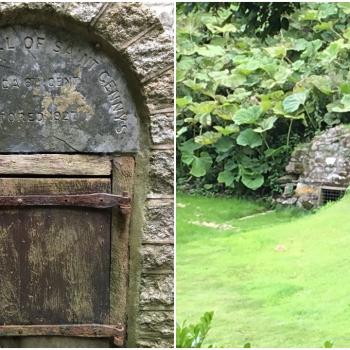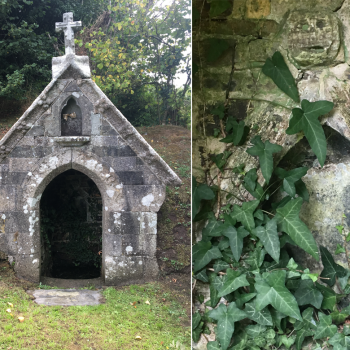Occasionally, my friends and I have mused about what it would be like to open a Pagan school.
In the UK, a state-funded Pagan faith school is not an impossibility. Under the current system, state schools are increasingly independent from local authority control, and such schools (academies and ‘free schools’) have a lot of freedom over their policies, teaching staff, curriculum etc. There are a number of routes you could go down to open a Pagan school, and as the Pagan community in the UK grows and becomes more visible, some may be tempted to seriously think that opening a Pagan school would be a good idea.
I admit, it’s rather fun to imagine what it would be like. We’d call it “The Goddess and God Primary School!” The school uniform would incorporate a cloak and the badge would have a pentagram on it! We’d call in the Four Quarters at assembly! We’d call the terms Beltane Term/Lammas Term etc., like they do in The Wicker Man! We’d teach children about the importance of venerating nature, respecting the deities and that magic is their friend! It’d be like a real-life Hogwarts!
Only, as amusing as this fantasy might sound in my head, I wouldn’t actually support the creation of a state-funded Pagan school. In fact, I don’t support any faith schools that are funded by public money. I actively oppose them, and I’d actively oppose a state-funded Pagan school. Let me explain why…
What I don’t oppose
Firstly, I do not oppose independent (private) faith schools. If a religious organisation or community wants to set up a school and fund it entirely themselves without using taxpayers’ money, that’s fine. Provided that it teaches the basic standard of education required of all schools (that includes teaching science as science) and adequately safeguards the pupils.
Likewise, if you want to opt out of state provision and have the means to do so by paying to send your child to a school of your choosing, including those that teach a particular faith, I believe you should have the right to do so. I may have issues with some of the state privileges afforded to religious bodies in the UK such as tax breaks, but that’s an issue for another time. I also support the right of parents to home educate their children, although I do think this sector needs more oversight and regulation.
So if a group of Pagans wanted to set up a Pagan independent school that was funded entirely through private means, I wouldn’t actively oppose it on principle (although I wouldn’t send my own kids there, for reasons explained below).
Secondly, I do not oppose Religious Education (RE) in state schools. There’s a whopping huge difference between teaching a religion (“We believe…”), and teaching about a religion (“Some people believe…”). When done well, RE can broaden awareness of the different faiths and beliefs that exist within our local communities and the wider world, and the differing worldviews and cultures that arise from those beliefs.
But when done poorly, as is often the case in faith schools, RE is narrow in scope or even confessional in nature. In my primary school, which was Roman Catholic, we never explored any religions outside Catholicism – I didn’t even realise there really were religions other than Christianity. But when I went to secondary school (which was not a faith school), I got to learn about all these other incredible religions and I was utterly intrigued. RE became one of my favourite subjects at secondary school.
Finally, I do not oppose individual religious expression in state schools, where appropriate and fair. I have nothing against optional lunchtime or after-school clubs that have a religious focus; I believe pupils (and teachers) have the right to form a club that teaches religion outside class hours, but again, such clubs should not teach hate or other anti-social values. But I do think we should abolish the ridiculous law we currently have meaning all schools, even non-faith schools, have to hold compulsory acts of collective worship every day that are broadly Christian in nature.
So what do I oppose?
I oppose state-funded schools that have a religious character or ethos. And yes, that would include Pagan faith schools. Here’s why:
#1 I want children to be free to develop their own beliefs. Supporters of faith schools often talk about “religious freedom,” but the fact is they’re rarely thinking about the freedom of the child. Faith schools exist to actively promote one specific ideology and to make sure the children that attend them adhere to that ideology. I really don’t like the thought of anyone becoming a Pagan simply because they were inculcated at school and didn’t know that there were any alternative ways to live. I’d much rather schools exposed children to a wide variety of beliefs, and let the children make up their own minds.
#2 I don’t want children to face religious discrimination. Many UK faith schools actively discriminate against children (and potential staff) if they do not share the religion of the school. Yes, this is totally legal. They’re given special exemptions from equality law to prioritise children whose parents belong to the “right” religion. Some even prioritise families of any faith over those of no faith, effectively making non-religious families second-class citizens.
Faith schools don’t have to do this, and indeed not all of them do. Some will not apply any religious test at all in admissions criteria. But even then, children who do not share the faith of the school will face more passive forms of discrimination. If your school is actively promoting a religious ideology that you do not share, can you honestly feel truly welcome? Do you think a child from a Christian family would really feel as comfortable as one from a Pagan family in a school that taught children to venerate the Horned God? That’s why I think schools should be religiously-neutral environments where families of all faiths and none are on an equal footing.
#3 I don’t want children to attend a faith school unwillingly. Parents rarely choose a school based on its religious character; they’re far more likely to look at criteria like its academic performance or how close it is to their home. But sometimes, the closest school might happen to be a faith school. I’d hate the idea of a child who didn’t want to go to a Pagan school having to go to one just because it was the nearest school to them. I don’t think Paganism should be forced on anyone who doesn’t want it, and I think most Pagans would agree with that.
#4 I don’t want religion to get in the way of education. At faith schools, religion can be so intertwined with the school’s character that it begins to affect the way even secular subjects are taught. This is very prominent in the way sex education is taught at UK faith schools. A recent study found examples of state-funded Catholic schools overtly teaching that contraception, sex outside of Christian marriage, masturbation and same-sex relationships are all morally wrong. I wouldn’t want my child’s sex education, or any other education, to be based on someone’s idea of what “Pagan teachings” are on these subjects. I would want my child’s school to teach the basic facts about sex and how to keep safe, not that fertility can be enhanced by making offerings to a phallic statue, for example. Those sorts of beliefs should not be the school’s business to teach.
#5 I don’t want a school defining what Paganism is. Paganism is extremely diverse and great value is placed on individual Pagans’ freedom to explore and define Paganism for themselves. But out of practicality, a Pagan faith school would have to commit to a particular Pagan path and teach that. It could be something quite different to my own beliefs. Having Pagan faith schools would run the risk of codifying Paganism; it would narrow the definition of what Paganism can be because it would become rigid and systematised. There’s also the risk that what’s considered “niche” sects of Paganism (like Odinism) would come to be regarded as the Pagan mainstream, even though they do not reflect what the majority of Pagans believe, if those particular sects happened to access more money and power than other sects.
This isn’t an unsubstantiated fear. We’re already seeing it with Hinduism in UK faith schools. The only state-funded Hindu schools in the UK are run by the Avanti Schools Trust. This trust is controlled by an ISKCON (a.k.a Hare Krishna) charity. In other words, the only state Hindu schools in the UK are Hare Krishna schools. Hare Krishna does not represent the beliefs and practices of the majority of Hindus in the UK or anywhere else.
#6 I don’t want state-sponsored Paganism. I don’t want tax payers to fund the promotion of Pagan beliefs. Partly because I don’t think it’s fair for tax payers to fund the promotion of religion at all (the state should be religiously-neutral), and partly because when something’s state-sponsored, it always creates the potential for the state to interfere. I don’t want the state to have a say in what Pagan beliefs and practices should or shouldn’t involve, unless it’s a practice that goes against the laws of the land or impinges on human rights. But a state-funded Pagan school might just give the state the ability to have a say in what goes on in Paganism. That’s why the state and Paganism need to steer well clear of each other, including in education. The same goes for all other religions and the state.
#7 I want children to mix with other children from all beliefs and walks of life. Faith schools create ghettos, where children become trapped in a bubble where the majority of people they’ll encounter all have the same religion. They lead to segregated communities where, for example, all the Christians go to one school, all the Muslims to another and everyone else to another, and so they’ll rarely get the chance to mix. It makes sense that when children from different backgrounds and beliefs study and play together every day, they learn to get along together. So why encourage faith-based segregation through faith schools? That’s why I’d never send my child to a Pagan faith school, if such a thing existed. I’d want them to mix with children from Christian families, Muslim families, Hindu families, Hare Krishna families, and families with no religion at all.
If you agree that all state-funded schools should be inclusive for people of all faiths and none, please consider joining the No More Faith Schools campaign.
You may also be interested in joining the National Secular Society, and the Pagans for Secularism Facebook group.













